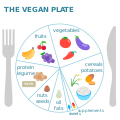Vegan nutrition
Nutritional aspects of a vegan diet

Vegan nutrition refers to the dietary intake and nutritional considerations of individuals who follow a vegan diet, which excludes all animal products. This includes meat, dairy, eggs, and other animal-derived substances. A well-planned vegan diet can provide all the necessary nutrients for a healthy lifestyle, but it requires careful attention to certain nutrients that are typically found in animal products.
Key Nutrients[edit]
Protein[edit]
Protein is essential for the growth and repair of tissues. Vegans can obtain protein from a variety of plant-based sources such as legumes, nuts, seeds, and soy products like tofu and tempeh.
Vitamin B12[edit]
Vitamin B12 is crucial for nerve function and the production of DNA and red blood cells. It is not naturally found in plant foods, so vegans need to consume fortified foods or take supplements to meet their B12 needs.
Iron[edit]
Iron is important for the formation of hemoglobin in blood. Plant-based sources of iron include lentils, chickpeas, beans, and spinach. Consuming vitamin C-rich foods alongside iron-rich foods can enhance iron absorption.
Calcium[edit]
Calcium is necessary for bone health. Vegans can obtain calcium from fortified plant milks, tofu, almonds, and leafy green vegetables like kale and bok choy.
Omega-3 Fatty Acids[edit]
Omega-3 fatty acids are important for heart and brain health. Sources for vegans include flax seeds, chia seeds, hemp seeds, and walnuts.
Vitamin D[edit]
Vitamin D is important for bone health and immune function. Vegans can obtain vitamin D from fortified foods, supplements, and exposure to sunlight.
Zinc[edit]
Zinc is important for immune function and cell division. Plant sources include beans, lentils, nuts, seeds, and whole grains.
Health Benefits[edit]
A vegan diet has been associated with various health benefits, including a lower risk of heart disease, high blood pressure, type 2 diabetes, and certain types of cancer. It is also linked to lower body mass index (BMI) and improved cholesterol levels.
Potential Challenges[edit]
While a vegan diet can be healthful, it requires careful planning to avoid nutritional deficiencies. Vegans need to be mindful of their intake of vitamin B12, iron, calcium, omega-3 fatty acids, and vitamin D.
Related Pages[edit]
References[edit]
<references group="" responsive="1"></references>
-
Vegan Plate
-
Vegan Food Pyramid
-
Flax Seeds
-
English Walnuts
Ad. Transform your life with W8MD's Budget GLP-1 injections from $75


W8MD offers a medical weight loss program to lose weight in Philadelphia. Our physician-supervised medical weight loss provides:
- Weight loss injections in NYC (generic and brand names):
- Zepbound / Mounjaro, Wegovy / Ozempic, Saxenda
- Most insurances accepted or discounted self-pay rates. We will obtain insurance prior authorizations if needed.
- Generic GLP1 weight loss injections from $75 for the starting dose.
- Also offer prescription weight loss medications including Phentermine, Qsymia, Diethylpropion, Contrave etc.
NYC weight loss doctor appointmentsNYC weight loss doctor appointments
Start your NYC weight loss journey today at our NYC medical weight loss and Philadelphia medical weight loss clinics.
- Call 718-946-5500 to lose weight in NYC or for medical weight loss in Philadelphia 215-676-2334.
- Tags:NYC medical weight loss, Philadelphia lose weight Zepbound NYC, Budget GLP1 weight loss injections, Wegovy Philadelphia, Wegovy NYC, Philadelphia medical weight loss, Brookly weight loss and Wegovy NYC
|
WikiMD's Wellness Encyclopedia |
| Let Food Be Thy Medicine Medicine Thy Food - Hippocrates |
Medical Disclaimer: WikiMD is not a substitute for professional medical advice. The information on WikiMD is provided as an information resource only, may be incorrect, outdated or misleading, and is not to be used or relied on for any diagnostic or treatment purposes. Please consult your health care provider before making any healthcare decisions or for guidance about a specific medical condition. WikiMD expressly disclaims responsibility, and shall have no liability, for any damages, loss, injury, or liability whatsoever suffered as a result of your reliance on the information contained in this site. By visiting this site you agree to the foregoing terms and conditions, which may from time to time be changed or supplemented by WikiMD. If you do not agree to the foregoing terms and conditions, you should not enter or use this site. See full disclaimer.
Credits:Most images are courtesy of Wikimedia commons, and templates, categories Wikipedia, licensed under CC BY SA or similar.
Translate this page: - East Asian
中文,
日本,
한국어,
South Asian
हिन्दी,
தமிழ்,
తెలుగు,
Urdu,
ಕನ್ನಡ,
Southeast Asian
Indonesian,
Vietnamese,
Thai,
မြန်မာဘာသာ,
বাংলা
European
español,
Deutsch,
français,
Greek,
português do Brasil,
polski,
română,
русский,
Nederlands,
norsk,
svenska,
suomi,
Italian
Middle Eastern & African
عربى,
Turkish,
Persian,
Hebrew,
Afrikaans,
isiZulu,
Kiswahili,
Other
Bulgarian,
Hungarian,
Czech,
Swedish,
മലയാളം,
मराठी,
ਪੰਜਾਬੀ,
ગુજરાતી,
Portuguese,
Ukrainian
